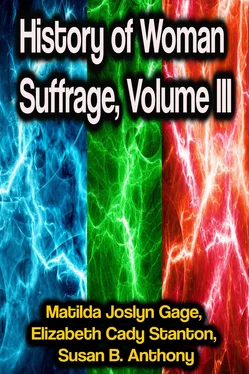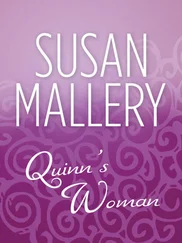Mr. Wadleigh says, "nor can woman justly complain of any partiality in the administration of justice." Let us examine: A few years ago a married man in Washington, in official position, forced a confession from his wife at the mouth of a pistol, and shot his rival dead. Upon trial he was triumphantly acquitted and afterwards sent abroad as foreign minister. A few months ago a married woman in Georgia, who had been taunted by her rival with boasts of having gained her husband's love, found this rival dancing with him. She drew a knife and killed the woman on the spot. She was tried, convicted, and, although nursing one infant, and again about to become a mother, was sentenced to be hanged by the neck till she was 'dead, dead, dead.' There is Mr. Wadleigh's equal administration of justice between man and woman! There is "the sympathy of judges and juries." There is the "extent which would warrant loud complaint on the part of their adversaries of the sterner sex." And this woman escaped the gallows not because of "the sympathy of the judge" or "jury," but because her own sex took the matter up, and from every part of the country sent petitions by the hundreds to Governor Colquitt of Georgia, asking her pardon. That pardon came in the shape of ten years' imprisonment;—ten years in a cell for a woman, the mother of a nursing and an unborn infant, while for General Sickles the mission to Madrid with high honors and a fat salary.
Messrs. Wadleigh of New Hampshire, McMillan of Minnesota, Ingalls of Kansas, Saulsbury of Delaware, Merrimon of North Carolina and Hill of Georgia, all senators of the United States, are the committee that report it "inexpedient" to secure equal rights to the women of the United States. But we are not discouraged; we are not disheartened; all the Wadleighs in the Senate, all the committees of both Houses, the whole congress of the United States against us, would not lessen our faith, nor our efforts. We know we are right; we know we shall be successful; we know the day is not far distant, when this government and the world will acknowledge the exact and permanent political equality of man and woman, and we know that until that hour comes woman will be oppressed, degraded; a slave, without a single right that man feels himself bound to respect. Work then, women, for your own freedom. Let the early morning see you busy, and dusky evening find you planning how you may become free.
But the most severe judgment upon Mr. Wadleigh's action came from his own constituents, who, at the close of the forty-fifth congress excused his further presence in the United States Senate, sending in his stead the Hon. Henry W. Blair, a valiant champion of national protection for national citizens.[37]
In April, 1878, Mrs. Williams transferred the Ballot-Box to Mrs. Gage, who removed it to Syracuse, New York, and changed its name to the National Citizen . In her prospectus Mrs. Gage said:
The National Citizen will advocate the principle that suffrage is the citizen's right, and should be protected by national law, and that, while States may regulate the suffrage, they should have no power to abolish it. Its especial object will be to secure national protection to women in the exercise of their right to vote; it will oppose class legislation of whatever form. It will support no political party until one arises which is based upon the exact equality of man and woman.
As the first step towards becoming well is to know you are ill, one of the principal aims of the National Citizen will be to make those women discontented who are now content; to waken them to self-respect and a desire to use the talents they possess; to educate their consciences aright; to quicken their sense of duty; to destroy morbid beliefs, and fit them for their high responsibilities as citizens of a republic. The National Citizen has no faith in that old theory that "a woman once lost is lost forever," neither does it believe in the assertion that "a woman who sins, sinks to depths of wickedness lower than man can reach." On the contrary it believes there is a future for the most abandoned, if only the kindly hand of love and sympathy be extended to rescue them from the degradation into which they have fallen. The National Citizen will endeavor to keep its readers informed of the progress of women in foreign countries, and will, as far as possible, revolutionize this country, striving to make it live up to its own fundamental principles and become in reality what it is but in name—a genuine republic.
Instead of holding its usual May anniversary in New York city, the National Association decided to meet in Rochester to celebrate the close of the third decade of organized agitation in the United States, and issued the following call:
The National Association will hold a convention in Rochester, N. Y., July 19, 1878. This will be the thirtieth anniversary of the first woman's rights convention, held July 19, 1848, in the Wesleyan church at Seneca Falls, N. Y., and adjourned to meet, August 2, in Rochester. Some who took part in that convention have passed away, but many others, including both Mrs. Mott and Mrs. Stanton, are still living. This convention will take the place of the usual May anniversary, and will be largely devoted to reminiscences. Friends are cordially invited to be present.
Clemence S. Lozier, M. D., President .
Susan B. Anthony, Chairman Executive Committee .
The meeting was held in the Unitarian church on Fitzhugh street, occupied by the same society that had opened its doors in 1848; and Amy Post, one of the leading spirits of the first convention, still living in Rochester and in her seventy-seventh year, assisted in the arrangements. Rochester, known as "The Flower City," contributed of its beauty to the adornment of the church. It was crowded at the first session. Representatives from a large number of States were present,[38] and there was a pleasant interchange of greetings between those whose homes were far apart, but who were friends and co-workers in this great reform. The reunion was more like the meeting of near and dear relatives than of strangers whose only bond was work in a common cause. Such are the compensations which help to sustain reformers while they battle ignorance and prejudice in order to secure justice. In the absence of the president, Dr. Clemence S. Lozier, Mrs. Stanton took the chair and said:
We are here to celebrate the third decade of woman's struggle in this country for liberty. Thirty years have passed since many of us now present met in this place to discuss the true position of woman as a citizen of a republic. The reports of our first conventions show that those who inaugurated this movement understood the significance of the term "citizens." At the very start we claimed full equality with man. Our meetings were hastily called and somewhat crudely conducted; but we intuitively recognized the fact that we were defrauded of our natural rights, conceded in the national constitution. And thus the greatest movement of the century was inaugurated. I say greatest, because through the elevation of woman all humanity is lifted to a higher plane. To contrast our position thirty years ago, under the old common law of England, with that we occupy under the advanced legislation of to-day, is enough to assure us that we have passed the boundary line—from slavery to freedom. We already see the mile-stones of a new civilization on every highway.
Look at the department of education, the doors of many colleges and universities thrown wide open to women; girls contending for, yea, and winning prizes over their brothers. In the working world they are rapidly filling places and climbing heights unknown to them before, realizing, in fact, the dreams, the hopes, the prophesies of the inspired women of by-gone centuries. In many departments of learning woman stands the peer of man, and when by higher education and profitable labor she becomes self-reliant and independent, then she must and will be free. The moment an individual or a class is strong enough to stand alone, bondage is impossible. Jefferson Davis, in a recent speech, says: "A Cæsar could not subject a people fit to be free, nor could a Brutus save them if they were fit for subjugation."
Читать дальше












